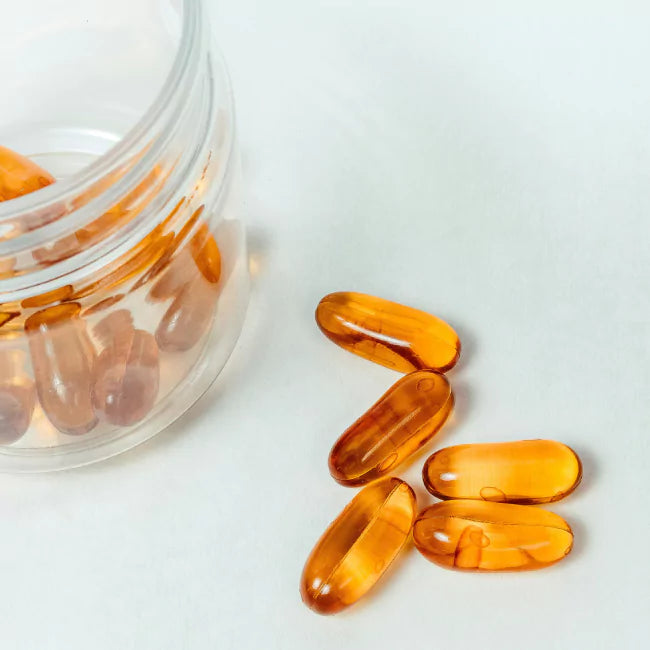Should I Take Amino Acids Pre-Workout?
 By: by Dr Robert Wolfe
By: by Dr Robert Wolfe

The before, during, or after debate on amino acids for working out can leave you utterly confused as to when you should take your amino acid supplement. I’ll cover the details, but the quick and easy answer to the question should I take amino acids pre-workout is yes! An amino acid pre-workout powder can help support muscle building, reduce the breakdown of muscle, increase blood flow to the muscle during your workout, and help prevent fatigue and boost performance.
Why Amino Acids Make Ideal Pre-Workout Supplements
You're taking your sports nutrition goals seriously. You load your plate with whole foods and make sure to prioritize quality protein at every meal. Maybe you're even incorporating protein powder or other dietary supplements into your regimen. You commit to each training session. You should be seeing major muscle growth gains and yet, you seem to be stuck.
The problem may be that you're ignoring just how essential a role the fittingly named essential amino acids play when it comes to increasing your muscle mass. No matter how much time you put into weight training, if you fail to provide your muscles with the raw materials they need to grow, you won't see the results you're craving.
Key Facts About Amino Acids
You may have heard amino acids described as the building blocks of protein. That's not a bad description, but it doesn't entirely do justice to the importance of amino acids.
Not only do amino acids provide structural integrity to protein, but they're also vital to the synthesis and metabolism of proteins, enzymes, hormones, and neurotransmitters. They regulate the activity of numerous metabolic pathways. They contribute to cognitive function. In short, amino acids are involved in just about everything that occurs inside the human body.
There are 20 amino acids present in the human body. Nine of those are called essential amino acids because unlike the others, your body cannot synthesize them de novo—in plain English, they can't be made from scratch. Instead, it's essential that you supply your body with these amino acids via the food you eat or supplements you take.
Researchers have categorized six of the other amino acids as conditionally essential. Under most circumstances, your body can produce these amino acids, but when you're under extreme duress, that ability becomes compromised.
The remaining four amino acids get grouped together as nonessential. In some instances, you'll see people refer to 11 nonessential amino acids—when they do so, they're simply lumping in the 7 conditionally essential amino acids listed above. Your body absolutely needs the nonessential amino acids, but it also has the ability to synthesize them, so it's nonessential that you get them from your diet.

When it comes to using amino acid supplements to facilitate muscle growth and muscle recovery, all the key players can be found on that list of the nine essential amino acids. Here are some key facts about what each of these amino acids does inside your body.
Phenylalanine
The analgesic (pain-killing) and antidepressant properties of this amino acid typically spark the most excitement. It's also a precursor to norepinephrine and dopamine, two of the feel-good brain chemicals. When it comes to sports nutrition, the primary benefit of phenylalanine is that due to its ability to raise norepinephrine and dopamine levels in your brain, it may lower your rate of perceived exertion during exercise, helping you stay in a positive headspace through even the most grueling endurance exercise workouts. Our bodies also need phenylalanine to produce metabolism-regulating thyroid hormones.
Valine
A true power player when it comes to muscle synthesis, valine is both an essential amino acid and a branched-chain amino acid (BCAA)—more on these later. One of valine's main functions is preventing muscle breakdown. That means if you take valine prior to or during an exercise session, it can help decrease muscle damage, allowing you to recover faster. Valine also stimulates your central nervous systems and regulates blood sugar levels.
Threonine
This amino acid helps keep your connective tissues and muscles strong and elastic, in part because it's a precursor for two other amino acids: serine and glycine. The benefits of glycine have received a lot of attention from researchers lately. Studies show it can encourage muscle growth as well as decrease muscle loss, among other desirable effects. Threonine can also shorten the time it takes your body to heal wounds and recover from injuries. Plus, it supports healthy fat metabolism and stops fat from building up in the liver.
Tryptophan
Another amino acid that serves as a precursor for a feel-good brain chemical—in this case, serotonin, which can help quell physical sensations of pain. That means boosting your tryptophan can increase your tolerance for pain during challenging workouts. The human body also needs tryptophan to manufacture vitamin B3, which ensures your blood sugar levels stay balanced, forestalls free radical damage, and stymies the accumulation of cholesterol.
Isoleucine
Like valine, isoleucine is both an essential amino acid and a branched-chain amino acid. It's a crucial component of hemoglobin, the protein in your red blood cells that transports oxygen. Our bodies also use isoleucine for muscle repair, which means upping your isoleucine levels lets you bounce back faster from taxing workout sessions.
Methionine
The principal task of this amino acid is to assist your body with metabolizing fat. Plus, it provides your body with the sulfur it needs to produce glutathione, its most abundant antioxidant compound, as well as cysteine and taurine, two other amino acids that contain sulfur. Thanks to its lipotropic properties, methionine can safeguard your liver function by preventing the buildup of fats.
Histidine
This amino acid, which has some antioxidant properties itself, is a precursor to histamine and helps your body synthesize carnosine. This can directly impact your physical performance because histamine can flush the potentially damaging free radicals generated during exercise from your system, while carnosine keeps lactic acid from accumulating in your muscles.
Leucine
Along with valine and isoleucine, leucine is both an essential amino acid and a branched-chain amino acid. It's the most abundant amino acid found in human muscle tissue. In addition to enhancing stamina and endurance as well as promoting muscle recovery, leucine initiates the process of protein synthesis and helps to maintain your body's nitrogen balance and energy supplies.
Lysine
Research indicates that lysine can simulate the release of growth hormone, meaning it can offer vital support to your muscle-building efforts. Lysine also ensures your body properly absorbs calcium. Plus, it demonstrates significant antiviral properties and encourages the production of antibodies, making it a phenomenal immune system booster.
Understanding Branched-Chain Amino Acids
Scientific analysis shows that 35% of your muscle protein is composed of three essential amino acids: valine, isoleucine, and leucine. These are, as you may have noticed if you've been paying close attention, the infamous branched-chain amino acids (BCAAs). These amino acids get their name from their molecular structures, which have distinctive, branch-like shapes.
The popularity of BCAA supplements with athletes skyrocketed based on studies indicating that they can help to reduce physical fatigue, sharpen mental focus, decrease muscle breakdown, preserve muscle glycogen stores, stimulate muscle protein synthesis, prevent muscle soreness, and more.
Leucine, found in high concentrations in whey protein, is arguably the most important BCAA. But as I mentioned earlier, simply increasing your intake of dietary protein or even adding a whey protein supplement is not the most effective way to benefit from leucine or other amino acids. When taken in supplement form, amino acids can be digested and absorbed more quickly, which maximizes their impact.
As I've discussed in previous articles, taking BCAA supplements is also not the most effective way to increase muscle concentrations of these beneficial compounds. There's no question that BCAAs facilitate muscle growth and optimize athletic performance, but when you take them on their own, they have a minimal impact.
That's because in order for your body to build complete proteins, it requires all the essential amino acids—and in their appropriate concentrations. Taking a supplement that contains only BCAAs throws off your amino acid balance. Taking an essential amino acid (EAA) supplement that contains the appropriate ratios of all the amino acids needed for protein synthesis is a far better way to amplify your muscle-building results.
When Should I Take My Amino Acids?
Now that you have an increased understanding of how amino acids prevent protein breakdown, facilitate healthy weight loss, improve recovery, and increase energy levels, among other benefits pertinent to those engaged in various physical pursuits, let's discuss the optimal timing for taking an amino acid supplement.
One of the main reasons to take amino acids for fitness is to build muscle. When you exercise, muscle breaks down in order to release amino acids for the energy the muscles need to contract. Some of the released amino acids are used to rebuild the lost muscle protein. But many of the amino acids are oxidized and cannot be used for muscle protein synthesis. That’s where taking amino acids pre-workout comes in. They help replace the amino acids that are oxidized when your muscle protein breaks down as you exercise.
Taking an amino acid pre-workout powder before resistance exercise is especially important to maintaining and building muscle mass. During resistance exercise blood flows to the muscles at an increased rate. When you ingest amino acids pre-workout, there are more essential amino acids available to strengthen and build muscle.
Taking amino acids before a cardiovascular workout, such as a high-intensity interval training (HIIT class), can help reduce fatigue by balancing the uptake of amino acids that are responsible for the production of the neurotransmitters serotonin and dopamine in the brain.
That said, taking amino acids after a workout (within an hour) gives your body a boost when it comes to replacing damaged muscle fibers with new muscle protein. Essential amino acids are also important for reducing inflammation, thereby accelerating workout recovery.
To maximize all the beneficial effects of amino acids, it's best to take a high-quality essential amino acid blend both before and after exercise. If you're carrying out a resistance-training regimen, you may also see benefits from taking amino acids during your training sessions. This approach to amino acid supplementation is optimal for improving muscle strength as well as accelerating recovery.
As for the best amino acid supplement...well, I highly recommend Perform, Amino Co's athletic performance blend. You can learn more about Perform here.


Up to 25% off Amino
Shop NowTAGS: bodybuilding cardiovascular strength training
Join the Community
Comments (0)
Most Craveable Recipes




 833-264-6620
833-264-6620



















